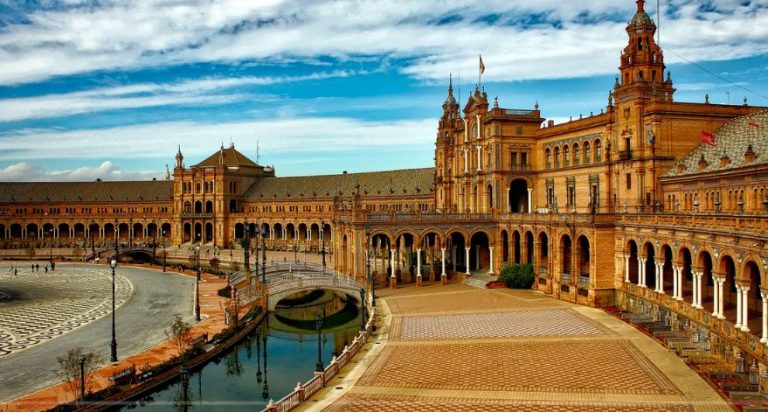10 Hidden Gems in Spain
Plan the Perfect Trip
Spain is a country rich in culture, history and vibrant traditions. From its lively cities to its beautiful landscapes, there's much to discover.
1. Hop-On, Hop-Off Bus Tours: The Perfect Way to See Spain’s Cities
Spain’s major cities, like Madrid, Barcelona and Seville, offer hop-on, hop-off bus tours that are an ideal way to explore. These tours allow you to see the city at your own pace. The buses follow a set route that stops at key landmarks and attractions. You can get off the bus at any stop to explore, then hop back on the next bus when you’re ready to continue.
These tours are great because they provide flexibility and convenience. Whether you want to visit the famous Sagrada Familia in Barcelona or the Royal Palace in Madrid, these bus tours make it easy to see everything without worrying about transportation.
2. Spain Has the Second Most UNESCO World Heritage Sites
Spain is home to an impressive 49 UNESCO World Heritage Sites, making it second only to Italy in the number of these protected cultural and natural landmarks. These sites include ancient Roman ruins, stunning cathedrals and beautiful natural parks.
Some of the most famous include the Alhambra in Granada, the historic center of Cordoba and the Way of St. James pilgrimage route. Visiting these sites offers a deep dive into Spain’s rich history and diverse cultural heritage.
3. Spain is the World’s Largest Producer of Olive Oil
When it comes to olive oil, Spain leads the world in both production and quality. The country produces around 50% of the world’s olive oil, much of which comes from the southern region of Andalusia. Spanish olive oil is known for its rich, fruity flavor and is a staple in the Mediterranean diet. Whether drizzled on salads, used in cooking, or simply enjoyed with bread, olive oil is an essential part of Spanish cuisine.
4. The Sagrada Familia Is Still Under Construction
One of Spain’s most iconic landmarks, the Sagrada Familia in Barcelona, has been under construction for over 140 years. Designed by the famous architect Antoni Gaudí, this breathtaking basilica is known for its intricate architecture and towering spires.
Although Gaudí began work on the Sagrada Familia in 1882, it remains unfinished due to the complexity of its design and interruptions caused by wars and financial issues. The completion is now planned for 2026, marking the centenary of Gaudí’s death, but even in its unfinished state, the Sagrada Familia attracts millions of visitors each year.
5. Spain is Home to the World’s Oldest Restaurant
Located in Madrid, Sobrino de Botín holds the Guinness World Record as the oldest continuously operating restaurant in the world. Founded in 1725, this historic eatery has been serving traditional Spanish dishes for nearly 300 years. The restaurant is particularly famous for its roast suckling pig and lamb, which are cooked in an ancient wood-fired oven. Dining at Sobrino de Botín is like stepping back in time, offering a unique experience that combines history with delicious food.
6. The Flamenco Dance Originated in Southern Spain
Flamenco, a passionate and expressive dance form, originated in the Andalusian region of southern Spain. This art form combines singing, guitar playing, dancing and handclaps to create a powerful and emotional performance.
Flamenco has deep roots in Spanish culture, influenced by the gypsies, Moors and Jews who lived in the region centuries ago. Today, you can experience authentic flamenco performances in cities like Seville, Granada and Madrid, where the dance continues to be an important part of Spain’s cultural identity.
7. Spain’s Tomatina Festival: The World’s Biggest Food Fight
Each year, the small town of Buñol in eastern Spain hosts La Tomatina, the world’s largest food fight. During this unique festival, thousands of people gather to throw overripe tomatoes at each other in the streets. The event began in 1945 and has since become a popular tradition, attracting visitors from around the globe. The festival takes place on the last Wednesday of August, and it’s a fun and messy way to experience Spanish culture in a completely different way.
8. Spain Has Four Official Languages
While Spanish (or Castilian) is the official language of Spain, the country also recognizes three other official languages: Catalan, Galician and Basque. Catalan is spoken in the northeastern region of Catalonia, including Barcelona, and the Balearic Islands.
Galician is spoken in the northwest region of Galicia, and Basque is spoken in the Basque Country in the north. Each of these languages has its own unique history and cultural significance, reflecting the diverse regional identities within Spain.
9. Spain’s Iconic Siesta Tradition
Spain is famous for its siesta, a mid-afternoon break that usually occurs between 2 PM and 5 PM. This tradition dates back to when agricultural workers took a break during the hottest part of the day. While the siesta is less common in modern urban areas, particularly with younger generations, it’s still practiced in many parts of the country. In small towns and rural areas, shops and businesses often close for a few hours in the afternoon, allowing people to rest before continuing with their day.
10. Spain Is the World’s Second Most Visited Country
Spain is a top destination for travelers, ranking as the second most visited country in the world after France. In 2019, Spain welcomed over 83 million international visitors. Tourists are drawn to Spain for its rich cultural heritage, beautiful beaches, delicious food and vibrant cities.
From the bustling streets of Barcelona to the serene beaches of the Costa del Sol, Spain offers something for everyone. The country’s diverse landscapes, historic landmarks and lively festivals make it a favorite destination for travelers from around the world.
Flights from India
Traveling from India to Spain is a journey that connects two vibrant cultures and landscapes. Major Indian cities like Delhi, Mumbai and Bangalore offer flights to Spain's key destinations, including Madrid, Barcelona and Valencia. These flights are typically long-haul, taking around 10 to 12 hours, and are operated by several international airlines with options for both direct and connecting flights.
Airlines such as Air India, Emirates and Qatar Airways often provide these routes, with connections usually made through major European hubs like Frankfurt or Paris. With modern amenities and comfortable seating, flying to Spain from India offers travelers a smooth experience, allowing them to arrive refreshed and ready to explore the rich history and lively culture of Spain.
Spain’s Best-Kept Secrets
Spain is a country full of surprises, with a rich history, diverse culture and stunning landscapes. Each of these facts offers a deeper understanding of what makes Spain so unique and beloved by people all over the world. Whether you’re planning a visit or just want to learn more, these surprising facts about Spain are sure to intrigue and inspire.
Read on to learn some surprising facts about Ireland.


